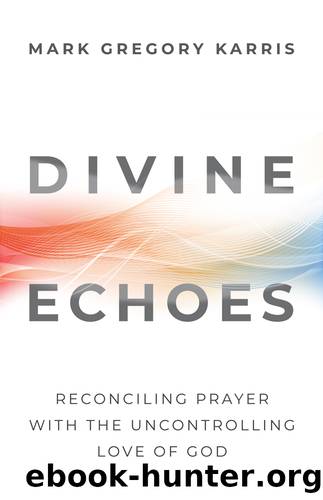Divine Echoes by Karris Mark Gregory

Author:Karris, Mark Gregory [Karris, Mark Gregory]
Language: eng
Format: epub
Publisher: Quoir
Published: 2018-01-23T00:00:00+00:00
GOD IS NOT IN CONTROL
Today, as we are bombarded with horrific stories and shocking images all day long, the overwhelming evidence of evil creates an enormous amount of cognitive dissonance that demands a verdict. The idea of a Blueprint God, who is sovereignly in control of all things like a Grand Puppet Master, is untenable.
I hypothesize that Christians who believe in a God who is not only in complete control, but who, in his sovereign will, has planned out in advance all the events that will ever occur in our lives, would not be able to maintain this position if they were forced to watch on a screen all the evil taking place worldwide in any given one-hour period of time. Granted, an experiment of that nature would probably cause the person to go insane or, at the very least, to be scarred for life. Assuming they could maintain their sanity, it is highly unlikely they could continue to hold so firmly to the belief that all things occur according to Godâs loving will and intricately mapped-out plan.
When we get past the Christian platitudes, if we take the risk of facing the chaos that unfolds before us on a daily basis, and if we reflect on the nature of prayer, it becomes apparent that many questions remain. Philip Yancey quotes an inquisitive philosophy professor, with whom he had communicated about the nature of both evil and prayer:
If God can influence the course of events, then a God who is willing to cure colds and provide parking spaces but is not willing to prevent Auschwitz and Hiroshima is morally repugnant. Since Hiroshima and Auschwitz did occur, one must infer that God cannot (or has a policy never to) influence the course of worldly events. 10
Oordâs model of essential kenosis helps us understand that we should not imagine that God was unwilling to influence the course of horrific events, such as Auschwitz and Hiroshima. Rather, we should recognize that the character of Godâs powerful love is self-giving, others-empowering, uncontrolling, and noncoercive. 11 Oord writes: âBecause love is the preeminent and necessary attribute in Godâs nature, God cannot withdraw, override or fail to provide the freedom, agency, self-organizing and lawlike regularity God gives. Divine love limits divine power.â 12 Godâs uncontrolling love defines what he can and cannot do. And, contrary to popular belief, there are indeed some things God cannot do, as Scripture itself teaches. God cannot lie (Hebrews 6:18); he cannot be tempted (James 1:13); he cannot be prejudiced (Acts 10:34â35); he cannot sin (Deuteronomy 32:4); and he cannot get tired (Isaiah 40:28).
And God cannot unilaterally control people and events. It is not that God did not want to stop the events at Auschwitz and Hiroshima. It is that God simply could not control the people and lawlike regularities involved in those events to stop them from occurring. Theologian Thomas G. Belt reminds us:
We can know that for any given evil, God, being perfectly loving, always does all God can do
Download
This site does not store any files on its server. We only index and link to content provided by other sites. Please contact the content providers to delete copyright contents if any and email us, we'll remove relevant links or contents immediately.
What Is the Gospel? (Foreword by D. A. Carson) by Greg Gilbert(990)
Jesus in Me by Anne Graham Lotz(970)
Daily Strength: Devotions for Bible Believing Study by Douglas Stauffer & Andrew Ray & Rick Quatro(899)
Christian Ethics by Wilkens Steve;(860)
The Practice Is the Path by Tias Little(823)
New Morning Mercies by Tripp Paul David(808)
Cleaning Up Your Mental Mess by Dr. Caroline Leaf(741)
Veritas: A Harvard Professor, a Con Man and the Gospel of Jesus's Wife by Ariel Sabar(735)
Greatest Mystery in the World by Og Mandino(667)
The Creative Call by Janice Elsheimer(602)
No More Christian Nice Guy by Paul Coughlin(589)
Our Appointment with Life by Thich Nhat Hanh(575)
Monastic Archaeology by Unknown(568)
2084 by John C. Lennox(559)
This One Wild and Precious Life by Sarah Wilson(545)
Jesus--Awesome Power, Awesome Love (Discover 4 Yourself® Inductive Bible Studies for Kids) by Kay Arthur(534)
The Catholic Verses: 95 Bible Passages That Confound Protestants by Dave Armstrong(526)
The Duties of Parents by J.C. Ryle(519)
The Tale of the Tardy Oxcart (Swindoll Leadership Library) by Swindoll Charles R(507)
